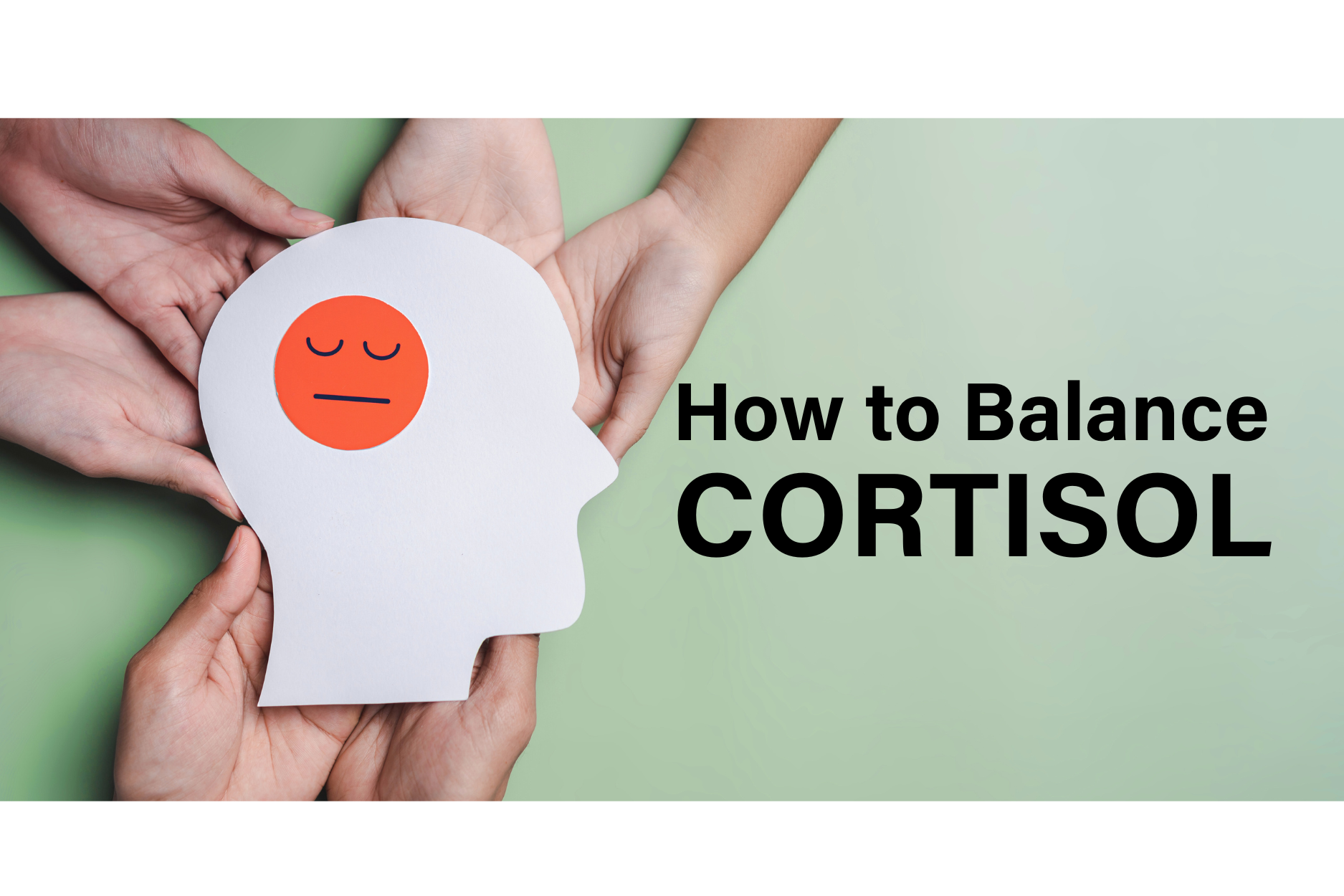
Cortisol Basics: The Stress Hormone and Balance
 Deadlines piling up, bills waiting to be paid, a family that needs your attention, and the constant ping of notifications from your phone. Stress is everywhere. Sometimes it helps push you to finish a project or deal with a challenge, but when it lingers for too long, stress feels like a toxic friend who never leaves your side.
Deadlines piling up, bills waiting to be paid, a family that needs your attention, and the constant ping of notifications from your phone. Stress is everywhere. Sometimes it helps push you to finish a project or deal with a challenge, but when it lingers for too long, stress feels like a toxic friend who never leaves your side.
At the centre of this story is cortisol, often called the stress hormone. Cortisol is not all bad. In fact, you would not survive without it. But when cortisol gets out of balance, the effects ripple through your entire body. You may feel drained, moody, foggy, or even sick.
In this guide, we are going to explore what cortisol really does, why balance matters, the dangers of too much or too little, and most importantly, natural ways you can bring it back into harmony. By the end, you will walk away with practical tips you can apply right now to feel calmer, healthier, and more in control.
What Exactly Is Cortisol?
 Cortisol is a hormone produced by your adrenal glands, two small but mighty glands that sit just above your kidneys. Its production is directed by your pituitary gland, which is a tiny pea-sized structure tucked at the base of your brain. Together, they act like a thermostat that keeps your stress response in check.
Cortisol is a hormone produced by your adrenal glands, two small but mighty glands that sit just above your kidneys. Its production is directed by your pituitary gland, which is a tiny pea-sized structure tucked at the base of your brain. Together, they act like a thermostat that keeps your stress response in check.
Cortisol plays a huge role in several vital functions, such as:
-
Fueling the fight or flight response so you can handle stress [1]
-
Regulating metabolism and how your body uses carbs, fats, and proteins [2]
-
Keeping blood pressure stable [3]
-
Controlling inflammation so your immune system does not go into overdrive [4]
In short, cortisol helps keep you alive and responsive to challenges. But like many things in the body, the key is balance. Too much or too little cortisol can throw your system off track in ways that affect everything from your mood to your waistline.
The Dangers of Imbalanced Cortisol
 High Cortisol Levels
High Cortisol Levels
When your body produces too much cortisol for too long, usually because of chronic stress, problems follow. [5] It is like leaving your car engine running all day without a break. Eventually, something burns out.
Potential effects of high cortisol include:
-
Damage to brain cells and changes in neurotransmitters, which can cause mood swings, irritability, and memory lapses
-
Weight gain, especially around the belly and midsection
-
Blood sugar issues and a higher risk of insulin resistance
-
A weakened immune system that makes you prone to getting sick
-
Digestive discomfort, bloating, or an upset stomach
This explains why people under constant stress often feel moody, exhausted, and physically worn down.
Low Cortisol Levels
On the flip side, not producing enough cortisol is just as risky. [6] This condition can happen when the adrenal glands are not functioning properly or when stress has been ongoing for so long that the system starts to shut down.
Common symptoms of low cortisol include:
-
Fatigue and ongoing weakness
-
Dizziness or feeling faint when standing up
-
A flat or low mood that feels like emotional burnout
-
Weight loss and a lack of appetite
Whether cortisol levels are too high or too low, the result is the same: your body struggles to find its balance.
Corticosteroids: Medical Help for Cortisol Issues
When your body cannot regulate cortisol properly on its own, doctors sometimes prescribe corticosteroids. [7] These are synthetic versions of cortisol that can help restore balance in serious cases.
While they can be effective, corticosteroids also come with a list of side effects. Some of the most common are:
-
Unwanted weight gain
-
Higher blood sugar levels
-
Thinning of the skin
-
Mood swings and irritability
-
Vision problems
This is why many people look for natural ways to support their cortisol levels before relying on medication. Lifestyle changes, food, and supplements often provide a gentler and more sustainable way forward.
How Food Can Help Balance Cortisol
 You really are what you eat, and your diet has a direct effect on how your body handles stress. [8] Whole, nutrient-rich foods can calm cortisol, while heavily processed and sugary foods can fan the flames.
You really are what you eat, and your diet has a direct effect on how your body handles stress. [8] Whole, nutrient-rich foods can calm cortisol, while heavily processed and sugary foods can fan the flames.
Cortisol-Lowering Foods
Some foods are especially powerful at bringing stress levels down. These include:
- Green tea, which contains calming compounds like L-theanine
- Olive oil, packed with healthy fats that reduce inflammation
- Berries, rich in antioxidants to protect your brain and body
- Dark chocolate (in moderation), which boosts mood and lowers stress hormones
- Chamomile tea, a traditional remedy for relaxation
- Garlic and turmeric, both of which fight inflammation
- Fatty fish like salmon, high in omega-3s that support brain and mood health
Prebiotic-Rich Foods
Your gut plays a bigger role in mood and stress than most people realise. Prebiotics feed the good bacteria in your gut, which then support your nervous system and influence how you handle stress. Great prebiotic foods include:
- Bananas
- Asparagus
- Lentils and beans
- Onions, garlic, and leeks
- Barley and other whole grains
Making these foods part of your daily diet is not a quick fix, but over time they build resilience and make it easier for your body to handle life’s challenges.
Supplements That Support Cortisol Balance
 Beyond food, supplements can also help bring cortisol levels back into balance. One of the most popular categories is adaptogens. These are natural herbs that help the body adapt to stress, whether you need to calm down or lift your energy.
Beyond food, supplements can also help bring cortisol levels back into balance. One of the most popular categories is adaptogens. These are natural herbs that help the body adapt to stress, whether you need to calm down or lift your energy.
The Best Adaptogens for Stress and Cortisol
-
Rhodiola Rosea supports mental clarity and helps reduce fatigue
-
Ashwagandha has been shown in clinical studies to lower stress and anxiety
-
Panax Ginseng boosts focus and resilience when stress feels overwhelming
-
Holy Basil helps regulate adrenal function and encourages relaxation
-
Schisandra Berry sharpens mental clarity while reducing cortisol spikes
Adaptogens have been used for centuries, and today they are widely recommended for supporting adrenal health and daily stress management.
You can find some of these powerful adaptogens in Savvy Calm Water and Savvy Greens+Calm. Both blends combine calming botanicals like Schisandra, California Poppy, and L-Theanine to help you stay relaxed and focused. [9]
And if you are looking for a better alternative to coffee, Savvy Focus Coffee blends nootropics and adaptogens to deliver steady energy without the jitters or afternoon crash.
Lifestyle Habits to Naturally Lower Cortisol
 Diet and supplements are important, but your daily lifestyle choices play a huge role in keeping stress at bay. [10] Small habits add up to a big difference.
Diet and supplements are important, but your daily lifestyle choices play a huge role in keeping stress at bay. [10] Small habits add up to a big difference.
Practical ways to lower cortisol naturally include:
- Moving your body regularly, even with short daily walks
- Prioritising seven to nine hours of quality sleep each night
- Practising mindfulness, meditation, or deep breathing
- Focusing on one task at a time instead of juggling too many
- Spending time outside in the fresh air and sunlight
- Taking regular digital detoxes to step away from screens
- Connecting with loved ones and building supportive relationships
- Playing with pets or enjoying time with animals
- Exploring creative hobbies like painting, writing, or music
These activities do more than just relax you in the moment. They actually retrain your nervous system, signalling to your body that it is safe to shift out of stress mode.
Final Thought
Cortisol is powerful. It can either support your health or sabotage it depending on whether it is balanced. While stress is impossible to avoid completely, you can take meaningful steps to manage it. Through nourishing food, targeted supplements, and intentional daily habits, you give your body the tools it needs to reset and find calm.
Most importantly, remember that stress management is not just about avoiding problems. It is also about creating space for joy. Laughing with friends, losing yourself in a hobby, or simply resting without guilt all help bring cortisol into balance.
When you support your body with the right habits and tools, you will find yourself calmer, healthier, and more resilient no matter what life throws at you.
TL;DR (Too Long, Didn’t Read Summary)
Cortisol is your body’s main stress hormone, helping regulate energy, metabolism, and immune function. Too much can lead to weight gain, mood swings, and brain fog, while too little causes fatigue and weakness. Balance is key. You can support cortisol naturally through food (green tea, salmon, berries), prebiotics (bananas, beans, onions), and adaptogens like Rhodiola, Ashwagandha, and Schisandra. Daily habits such as sleep, exercise, meditation, and spending time outdoors are equally important. For natural support, products like Savvy Calm Water, Savvy Greens+Calm, and Savvy Super Coffee combine adaptogens and nootropics to help you manage stress and energy without the crash. For Australians dealing with modern stress, focusing on cortisol balance is an essential step toward feeling calm, clear, and energised.
References:
[2] Cortisol in teleosts: dynamics, mechanisms of action, and metabolic regulation
[3] Cortisol metabolism in hypertension
[5] What Is the Confusion With Cortisol?
[6] Low Cortisol and Risk and Resilience to Stress-Related Psychiatric Disorders
[7] Clinical Pharmacology of Corticosteroids
[8] The effect of diet components on the level of cortisol
[9] Savvy CALM Starter Nootropic Stack
[10] Lifestyle, stress and cortisol response: Review II







